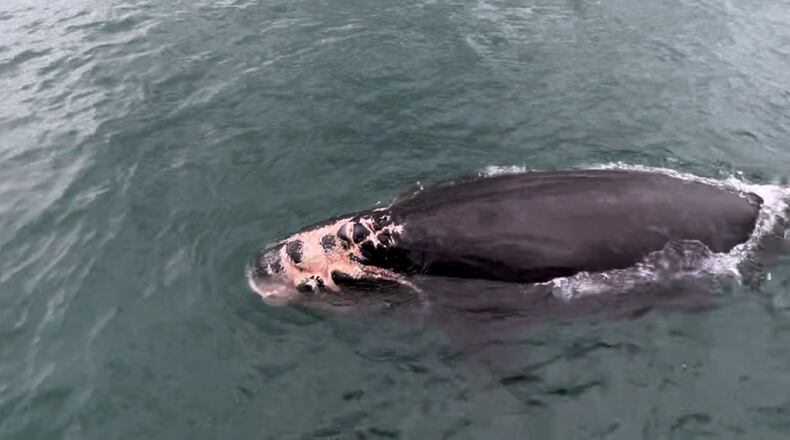One of just nine documented North Atlantic right whale calves born off the Southeast U.S. coast this winter has been critically injured by an apparent boat strike, the Georgia Department of Natural Resources (DNR) said Wednesday.
Boaters are urged to report sightings but not to approach the animal, which was last seen with its mother on Jan. 3 by anglers fishing off South Carolina’s South Edisto River inlet. Right whales are the most critically endangered large whale species, with a population of about 350 remaining in the world.
Jessica Thompson, a wildlife biologist and the state’s manager for the marine mammal program, said the whale’s injuries appeared to be consistent with those caused by a boat propeller, but scientists have not been able to determine the size of the boat, based on photos of its injuries taken by the anglers.
Boat strikes and entanglements in fishing gear are the biggest threats to the whales.
“These two are kind of the poster child for what’s happening with right whales, and the risk to right whales,” Thompson said.
Thompson said scientists hope to spot the mother and calf pair during previously scheduled aerial surveys this week and are also counting on the public to document sightings from at least 500 yards away.
“Any sighting is really helpful and then we can send out our teams to confirm,” Thompson said.
Environmental advocates seized on the news to highlight a pending regulation that would make a series of changes to right whale protections, including applying speed limits to smaller boats.
“It’s been almost a year and a half since the Biden administration proposed the new vessel speed rule to help protect North Atlantic right whales from this very threat – boat strikes,” Gib Brogan of Oceana said in a statement. “Today we’re still waiting for the government to do what it knows needs to be done.”
This coverage is supported by a partnership with Green South Foundation and Journalism Funding Partners. You can learn more and support our climate reporting by donating at ajc.com/donate/climate/
About the Author
Keep Reading
The Latest
Featured



